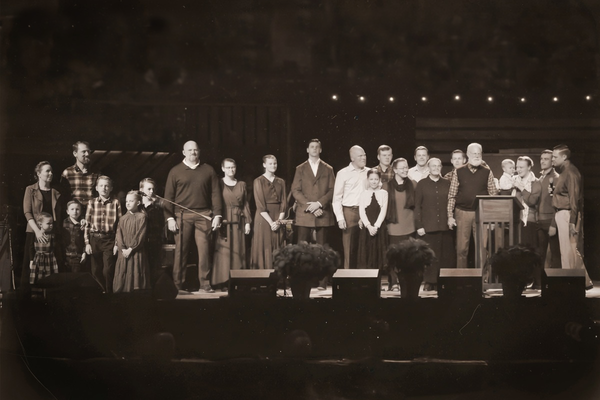Vanity or Eternal Purpose
Death strips away illusion. But if every frailty draws us nearer to God, then even the undoing becomes mercy. Grandpa’s life was no vapor—it sang through tatters, clinging to grace. May we live so that, even in death, our faith still speaks.

I wanted to take a few moments to share some of the realities, insights, and losses our family has been facing. A week ago today, I preached my grandfather’s funeral—memorializing a 97-year-old gentleman who bore witness to humility, integrity, and childlike faith in God. Then, last night, as we were still gathered at the supper table, my phone rang. My grandma—Grandpa’s lifelong partner and soulmate—had passed away, exactly one week to the day after his funeral.
I’ve had the privilege of being at the bedside of many in their final hours. And what would likely surprise those unfamiliar with that experience is just how ordinary death is. The gravity of entropy pulls so relentlessly on the human body that the real wonder is not how we die, but how we manage to resist the inevitable for 93 or 97 years, as my grandparents did. We like to think of death as a dreaded but rare bolt of tragedy, flashing into our lives to steal away those we love while most of us miraculously evade it. But death is ordinary. It is where we are all going.
I think of Solomon’s words:
“The heart of the wise is in the house of mourning, but the heart of fools is in the house of mirth” (Ecc. 7:4).
There is something gracious, mind-altering, and priority-clarifying about standing in the presence of death. In an instant, it mocks all the superficial anxieties and ambitions that once consumed us. It renders absurd the entire heap of our achievements, accolades, and opinions. In fact, it threatens to make life itself seem absurd. And this is why the apostle Paul writes:
“We do not sorrow as others who have no hope” (1 Thess. 4:13).
If our worldview is entirely material, self-seeking, and hedonistic, then what was all the striving for? The anguish, the effort, the dreams, the toil? If the blazing drama of human existence is snuffed out like a candlewick with no more wax to burn—just sputter, smoke, and sigh into darkness—then what was it all for? What was life for?
Wisdom in the House of Grief
This is the wisdom unlocked in the house of mourning. I spoke from Ecclesiastes at my grandfather’s funeral, where it says:
“‘Vanity of vanities,’ saith the Preacher, ‘vanity of vanities; all is vanity’” (Ecc. 1:2).
That the great works of great men will be forgotten, remembered no more by the generations to come. A puff of smoke. Spitting into the wind. Vanity.
But then, I contrasted that with the poignant words of the writer of Hebrews, who speaks of lives that did not flicker and vanish from the story of coming generations. He writes of Abel, the very first human death:
“By faith Abel offered to God a more excellent sacrifice than Cain, through which he obtained witness that he was righteous, God testifying of his gifts; and through it he being dead still speaks” (Heb. 11:4).
Here is a life that was not forgotten. A life, an effort, a sacrifice, and a story that death could not nullify. And, of course, all the heroes of faith fall into this category.
I think also of Jesus’ words when He reclined at Simon the Pharisee’s house, and a woman came in, broke her alabaster jar, and anointed His feet. Jesus said:
“Assuredly, I say to you, wherever this gospel is preached in the whole world, what this woman has done will also be told as a memorial to her” (Matt. 26:13).
What Remains?
At my grandfather’s funeral, I spoke about vanity—meaninglessness, a vaporous wisp of smoke. The sad glory of the flower, the withering grass, the fleeting importance of fleshly concerns—here today, gone tomorrow. Waves tossed in the ocean. Vapors in the wind. Vanity is what fades away and is forgotten—everything temporal, shallow, and centered in self.
But there is a Word that endures forever. Even though flesh is like the grass and the flower of the field, there are three things that remain:
“And now abide faith, hope, love, these three; but the greatest of these is love” (1 Cor. 13: 13).
And “love never fails” (1 Cor. 13:8).
The Fragility of Flesh and the Enduring Legacy of a Life Well Lived
“Life is real! Life is earnest!
And the grave is not its goal;
‘Dust thou art, to dust returnest,’
Was not spoken of the soul.
Not enjoyment, and not sorrow,
Is our destined end or way;
But to act, that each to-morrow
Find us farther than today.”
—Henry Wadsworth Longfellow
At the bedside of the dying, there is no avoiding the stark reality of human frailty. Flesh—once strong, animated by spirit and will—wanes into a waxen figure, unrecognizable as the beloved it once was. When the animating breath of God expires and the soul departs for incorporeal realms beyond our comprehension, the body is nothing more than a glove emptied of its hand, a garment crumpled on the ground, stripped of its beauty, its meaning.
And what remains? Photographs? Letters? Memories? Of course. But what truly remains of a life is what that life was devoted to—that which is eternal.
“The word of our God stands forever” ( Isa. 40:8).
“Love never fails” (1 Cor. 13:8).
“The mercy of the Lord is from everlasting to everlasting” (Ps. 103:17).
You see, the only thing that robs death of its disastrous indignity upon the human experience is the human choice to devote our time, our energy, our very lives as servants and conduits of the eternal God—to be vessels of His unending grace in the lives of those around us. The vapor vanishes away. But the hands of time cannot erase what was done for the glory of God in this fleeting existence. No, such labor, such love, such self-expenditure lives on in the hearts of generations.
They will not remember Grandpa’s military accolades. They will not recount his time on the golf course or tally up his small or great failures. What they will remember—what we who remain have been marked by—is what he did for the glory of God.
We will tell of a 97-year-old man, who, on Christmas Day, gathered his family and expressed a greater level of devotion and faith than ever before—declaring that he wanted to give more, to be remembered not as a soldier but as a brother in the fellowship of believers. We will remember his confession that his only regret was not giving and trusting everything to God sooner. That he had found love—undeniably real love—a love that serves without expectation of return. And that he wanted to be buried here, among his brothers and sisters in the faith.
A Life Surrendered or a Story without a Climax?
If we withhold that decisive surrender—that full yielding of ourselves to the Eternal—then all the prequel dramas of our lives seem pointless, building toward a climax that never comes, sputtering into ashes in a three-by-six-by-six-foot grave.
But when we surrender to God and become His servants, everything in our past takes on meaning. Every advance and setback, every challenge, conflict, and resolution was leading to this pivotal moment—this climactic choice to become what we were created to be: children and reflections of our Heavenly Father.
Then, the story of our whole life makes sense, has purpose, and is not wasted.
Breaking the Alabaster Jar
If we return to the story of the woman at Jesus' feet who came to Simon the Pharisee’s house that propitious night, we know that she must have felt as though her entire life had been eclipsed by failure to that point. It had become her identity—a sinner.
But at the feet of Jesus, a simple act of faith began etching hope and promise, forgiveness and redemption upon the hearts of the world. No one remembers the details of her shame, the specifics of her transgressions. What remains is this:
“She has come beforehand to anoint My body for burial… Assuredly, I say to you, wherever this gospel is preached in the whole world, what this woman has done will also be told as a memorial to her” (Matt. 26:12-13).
What is remembered is not her failures but that she gave Jesus a grace and an anointing ahead of His trial that no one else is recorded as having given.
What she did for and unto God blotted out and eclipsed all the tragedy of meaningless transgression and loss that had come before.
Her life was more than a vapor.
“Though she is dead, she still speaks.”
It is never too late—never beyond reach—for us to break our alabaster jars in a puddle of tears at the feet of Jesus. It is never too late, as long as there is breath, to abandon the restless, exhausting, anxious struggle for vanity and allow our Maker to fit us like a glove upon His hand—to touch hearts, impart grace, share love, and inspire hope.
And these will remain.
And this—this—is the only reason to be on this earth.
“What is desired in a man is kindness, and a poor man is better than a liar” (Prov. 19:22).
Footprints on the Sands of Time
“In the world’s broad field of battle,
In the bivouac of Life,
Be not like dumb, driven cattle!
Be a hero in the strife!
Lives of great men all remind us
We can make our lives sublime,
And, departing, leave behind us
Footprints on the sands of time;
Footprints, that perhaps another,
Sailing o’er life’s solemn main,
A forlorn and shipwrecked brother,
Seeing, shall take heart again.”
—Henry Wadsworth Longfellow
I shared another poem, one I also referenced at my dad’s funeral. It hints at the purpose that can emerge from life’s reductions—if we allow it:
“An aged man is but a paltry thing,
A tattered coat upon a stick, unless
Soul clap its hands and sing, and louder sing
For every tatter in its mortal dress.”
—W.B. Yeats, Sailing to Byzantium
The Stripping Away of Illusion
There’s nothing glamorous about death, nothing noble in its relentless march. It strips away our illusions, dismantles the props we lean on, and exposes the frailty we work so hard to deny.
To witness it—to watch strength wither, to see the once-unshakable tremble like leaves in the wind—is a sobering thing. They reach for something solid, yet the ground beneath them never stops shifting.
It is a fearful sight, this unraveling, this undoing. And yet, the poet reminds us:
“An old man is but a paltry thing, a tattered coat upon a stick—unless,” unless—this stripping down, this stark reduction, serves the soul in a way that makes it all worth it.
If dying makes you bitter, it is a shame. If sickness wracks the body, if age steals strength, if suffering shakes you to the core—and all you find in your grasp are straws—then it is a tragedy.
If the slow undoing of this mortal frame leaves you retreating, shrinking into fear, then it is a waste.
But if those same losses, those same reductions and pains, draw you closer to the heart of God, then they are worth it.
If they make you childlike instead of cynical, trusting instead of resentful, reaching instead of recoiling—then grace has done its work.
If your hands, in their thrashing, find the hand of God, then even the shaking becomes mercy.
If your suffering lifts your gaze from the dust to the heavens—from weakness to the Source of strength—then pain has birthed something deeper, something eternal.
It has carried you beyond mere endurance, beyond the fear of loss, into the only thing that lasts: faith.
And that faith is your salvation.
Yes—Grandpa’s soul clapped its hands and sang through the tatters of his mortal dress because every loss, every breaking, every frailty brought him closer to God.
May the same be true for us.
For this is our highest hope—that in our weakness, His strength is made perfect. That in surrender, we find true victory. That in losing all, we gain what cannot be taken away.
And that—and nothing less—is the measure of a life well lived, the mark of true greatness.





